The first five years of a child’s life is an important time. According to the Center on the Developing Child at Harvard University, 90% of a child’s brain development happens before the age of 5. Beginning at birth, these brain connections form through a child’s everyday experiences with the adults around them. These experiences have an impact on their overall physical, social, emotional, and cognitive development and ultimately, prepare them for future learning and for life.
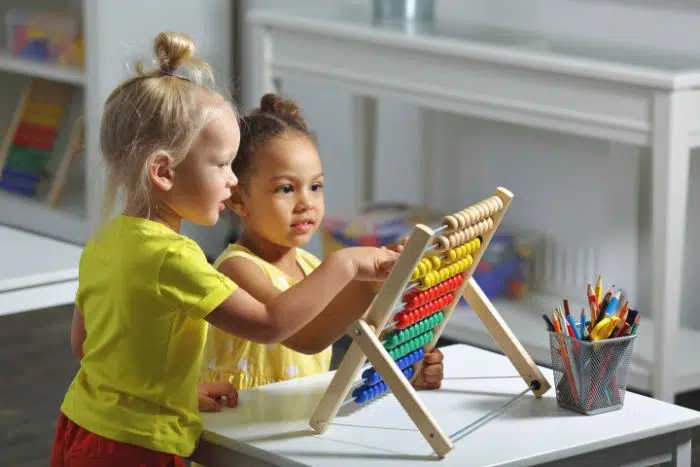
School Readiness
We often use the term school readiness, which means that children are ready for school, schools are ready for children, and families have the tools to support their children’s learning. Because parents and caregivers are a child’s first and most important teachers, the Cambridge Office of Early Childhood serves as a resource to ensure families have access to the wide variety of resources available through the city to support your child’s learning and development. The office also serves as the coordinating body for the transition from the many different early learning experiences (from home visiting, to family child care, to center-based care) to kindergarten.
Transition to Kindergarten Resources
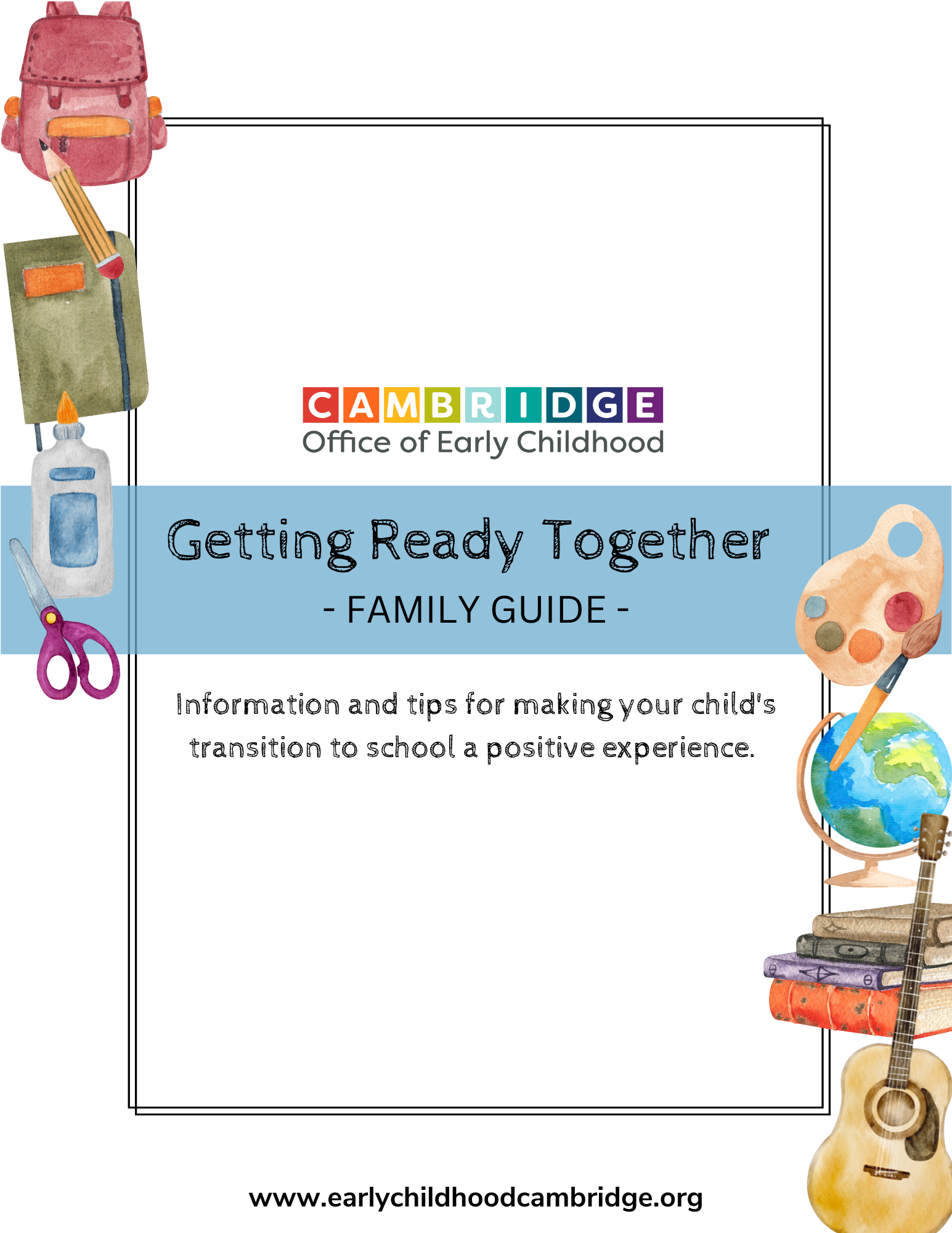
** Cambridge Office of Early Childhood 2023 Family Guide
Learn more about ways you can help your child transition into Cambridge Public School. Important contacts, skills to build over the summer, and information about school readiness can be found in the guide.
Guide: Cambridge Office of Early Childhood 2023 Family Guide

** This Is A School Book Guide; Cambridge Office of Early Childhood
This Is A School by John Shu was included in every welcome mailing packet. Use this guide to talk about the start of school with your child and ask questions about what it is going to be like to start a new school.
Guide: This Is A School Book Guide
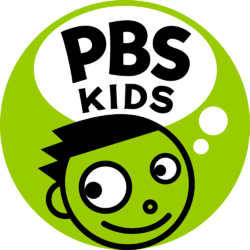
Child Development Milestones; PBS Kids
Five-year-olds are wonderful company. They have strong language skills and love to share their ideas and stories. They are creative problem solvers, eager to understand “how” and “why” things work. Their reading, writing, and math skills are growing — and so are their social and emotional skills. With guidance and support from caring adults, they are developing the habits they need to thrive in school and beyond.
Website: https://www.pbs.org/parents/learn-grow/age-5
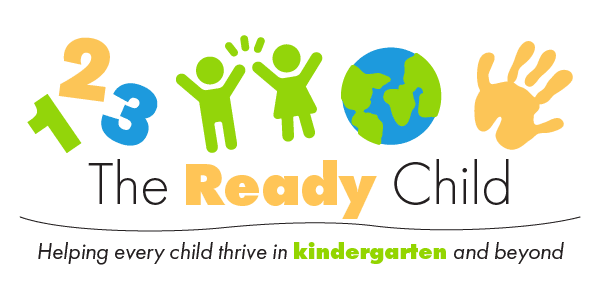
The Ready Child; University of Illinois Chicago College of Education
A website designed to give you the knowledge and skills you need to help every child succeed in kindergarten and in life.
Website: https://readychild.org/the-ready-family/
Building Foundational Skills through Play

Book List from National Center for Pyramid Model Innovations (NCPMI)
The Children’s Book List includes diverse examples of books that can be used to promote social-emotional skills such as feelings and emotions, friendships, kindness, and problem solving.

PLAY! Children learn through their play By: Laurel Bongiorno, NAEYC
Through play, children learn and develop:
- cognitive skills – like math and problem solving in a pretend grocery store
- physical abilities – like balancing blocks and running on the playground
- new vocabulary – like the words they need to play with toy dinosaurs
- social skills – like playing together in a pretend car wash
- literacy skills – like creating a menu for a pretend restaurant

Executive Functioning: 5 Games & Activities for Children (4-7 years)
Through games and playful activities, children can practice and strengthen important executive function skills that will help them throughout their lives, including learning to focus their attention, strengthening their working memory, and developing basic self-control.

PBS Kids: Ways to Encourage Purposeful Writing
One of the best ways to help children become writers is to show them through example that writing has useful purposes in your life.

Fun, Easy Ways to Play with Math at Home By: Jessica Mercer Young and Kristen E. Reed
Simple and easy ways to bring math into everyday life.
Early Learning Resources

Vroom provides science-based tips and tools to inspire families to turn shared, everyday moments into Brain Building Moments®.
Website: www.vroom.org/

Curious Parenting is your go-to resource for raising curious, resilient kids with calm and confidence.
Website: www.curiousparenting.net/

Grow Into Math helps busy parents build their preschooler’s intuitive understanding of math through joyful play.
Website: www.growintomath.com/prek
Parent Education and Home Visiting
Cambridge offers a variety of resources to support families during the early childhood years. There are many ways for parents and caregivers to gain knowledge, access information, and get support from a one time class or workshop, to a supportive relationship with an early childhood home visitor.


Agenda for Children Literacy Initiative
A program of the Cambridge Public Health Department, Agenda for Children Literacy Initiative offers the Let’s Talk and Pathways to Family Success Program. These programs support parents and caregivers in their role as primary teachers of language to support children with their language and literacy skills.

Center for Families
A program of the Cambridge Department of Human Services, CFF has an array of supports and programs for families with children ages 0-8. CFF provides playgroups, parent education and parent support, access to resources for families in times of need, infant massage, home visiting, Baby University and so much more!

Home-Based Early Childhood Education Program
A program of the Cambridge Public Schools and based on the national ParentChild + home visiting model, Home-Based uses home visits to support parents in their role as their child’s first teacher. Home-Based families have a child between the ages of 18 months and 3 1/2 years. The program provides 1 hour, weekly home visits from October to June.
In addition to our Cambridge-based partners, there are many other programs that support families during a pregnancy and through their child’s first years.
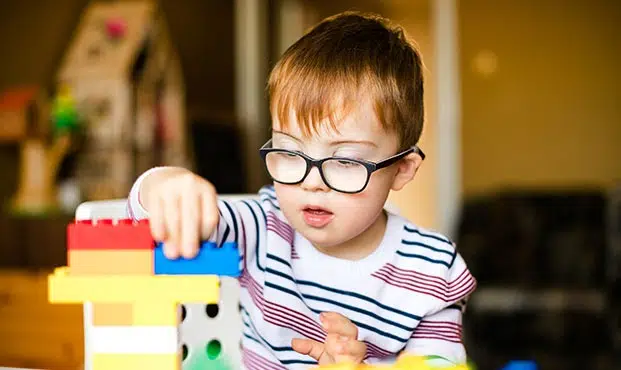
Riverside Early Head Start is a comprehensive early childhood, home visiting program that partners with parents to promote children’s healthy development. Their services prepare children to successfully enter preschool and help families learn important parenting skills. Riverside Early Head Start is part of a federal program administered nationally by the Office of Head Start.
